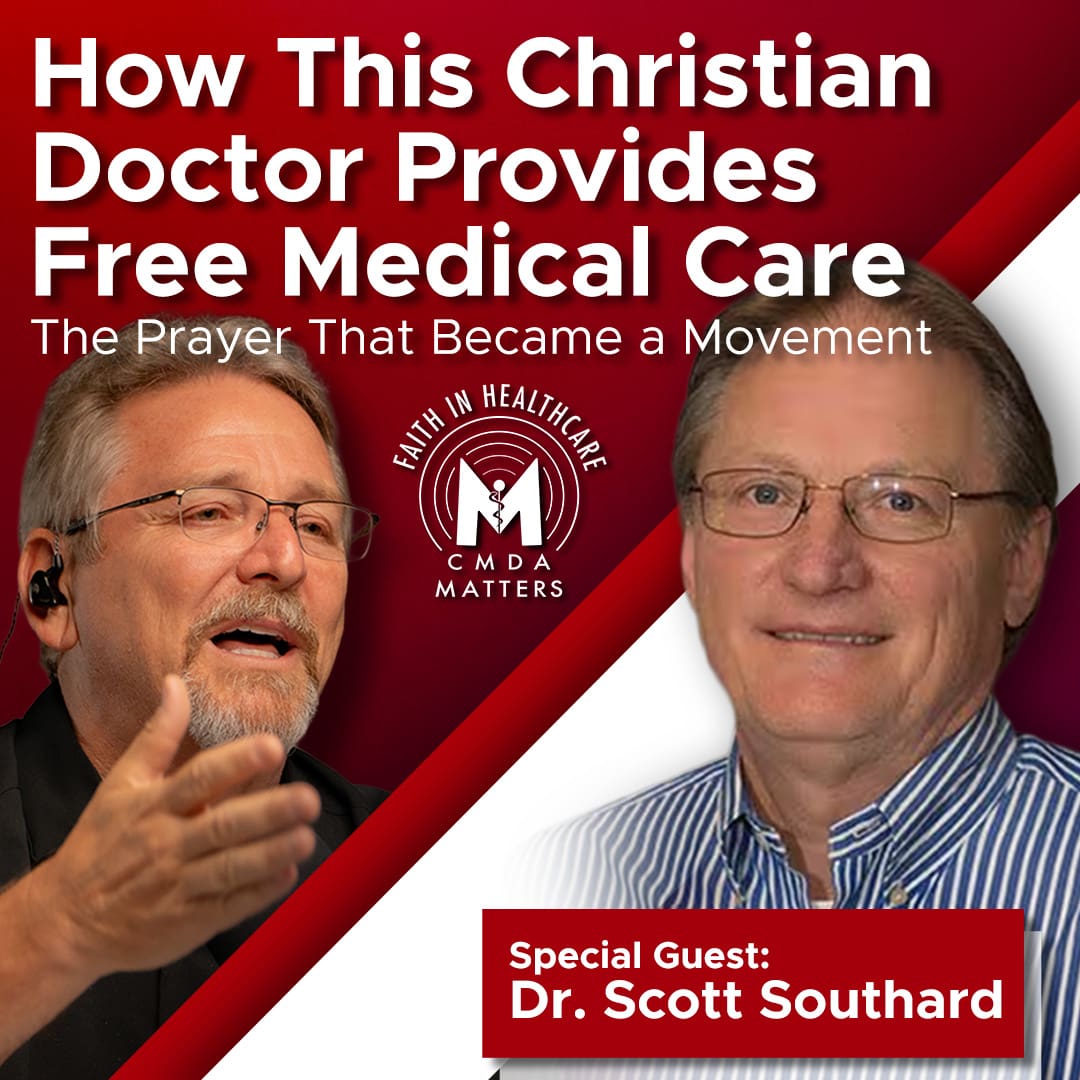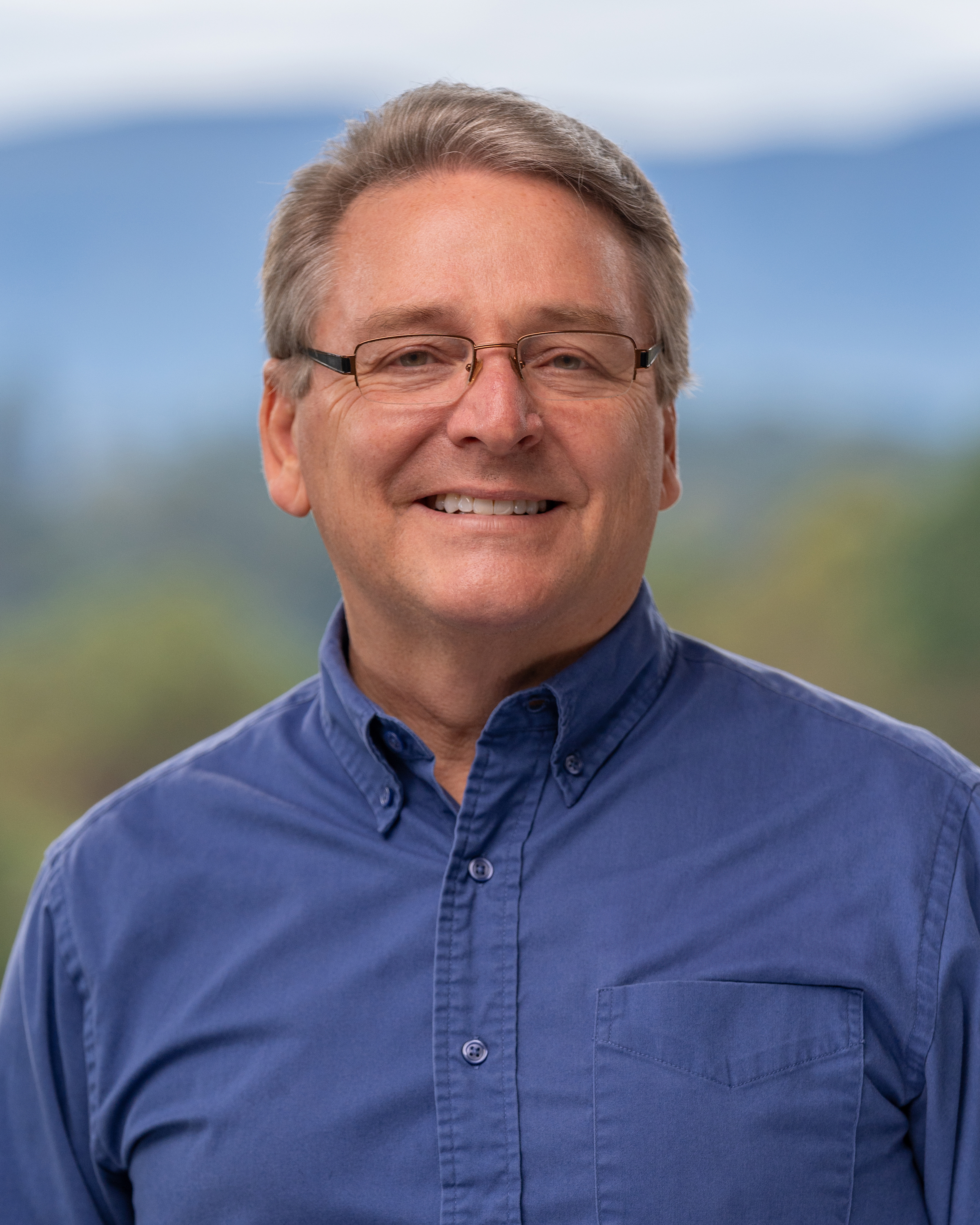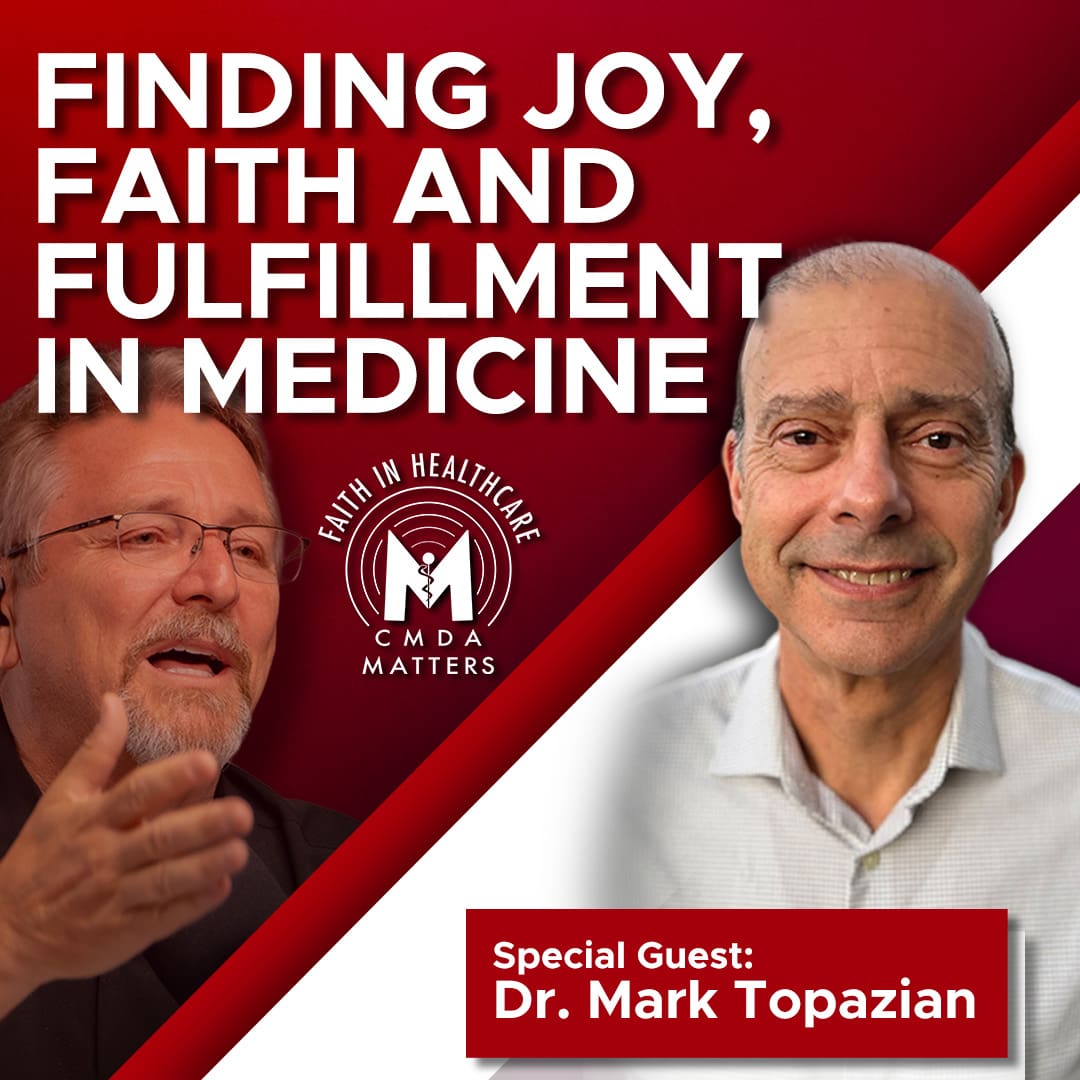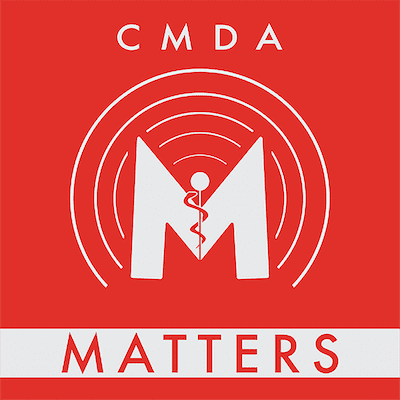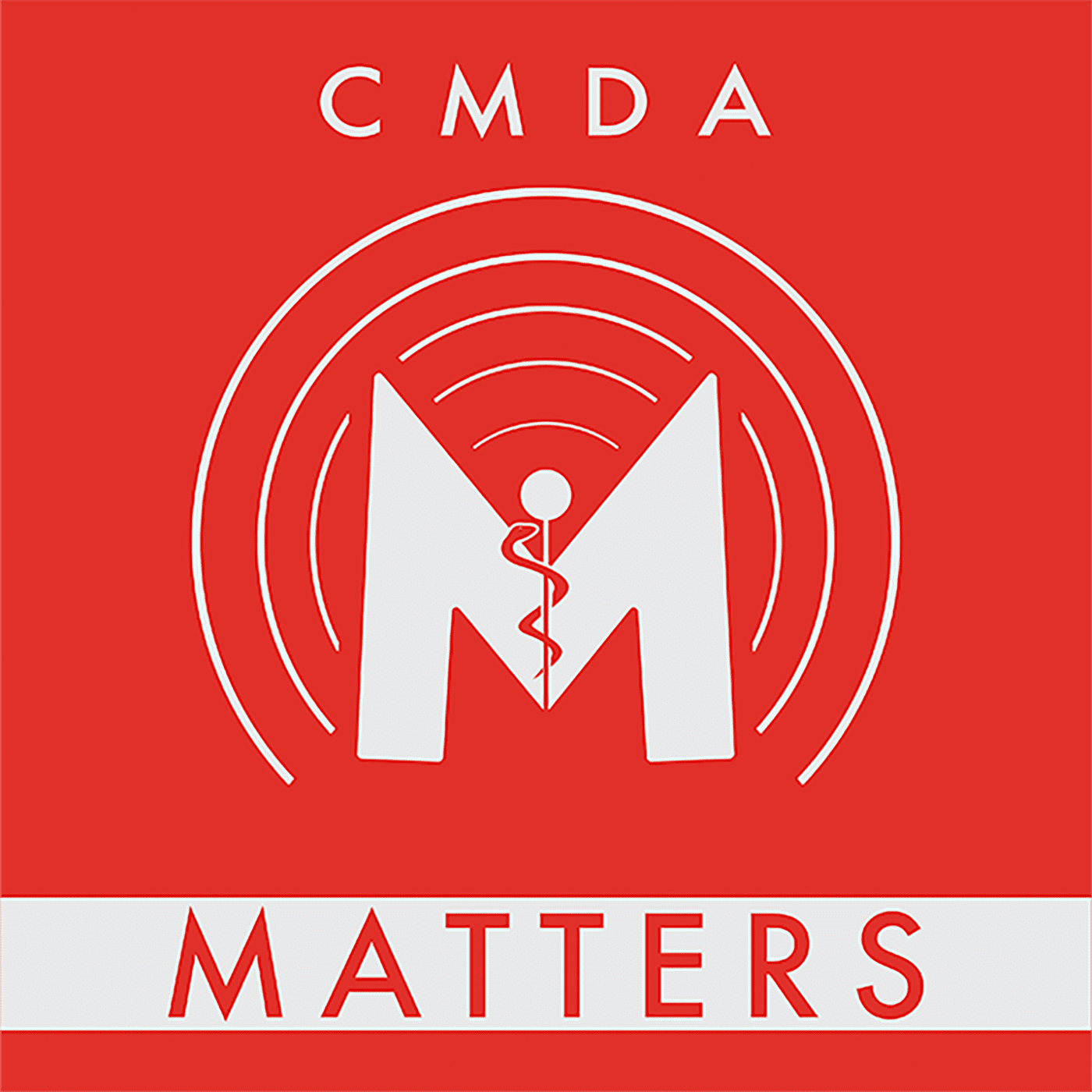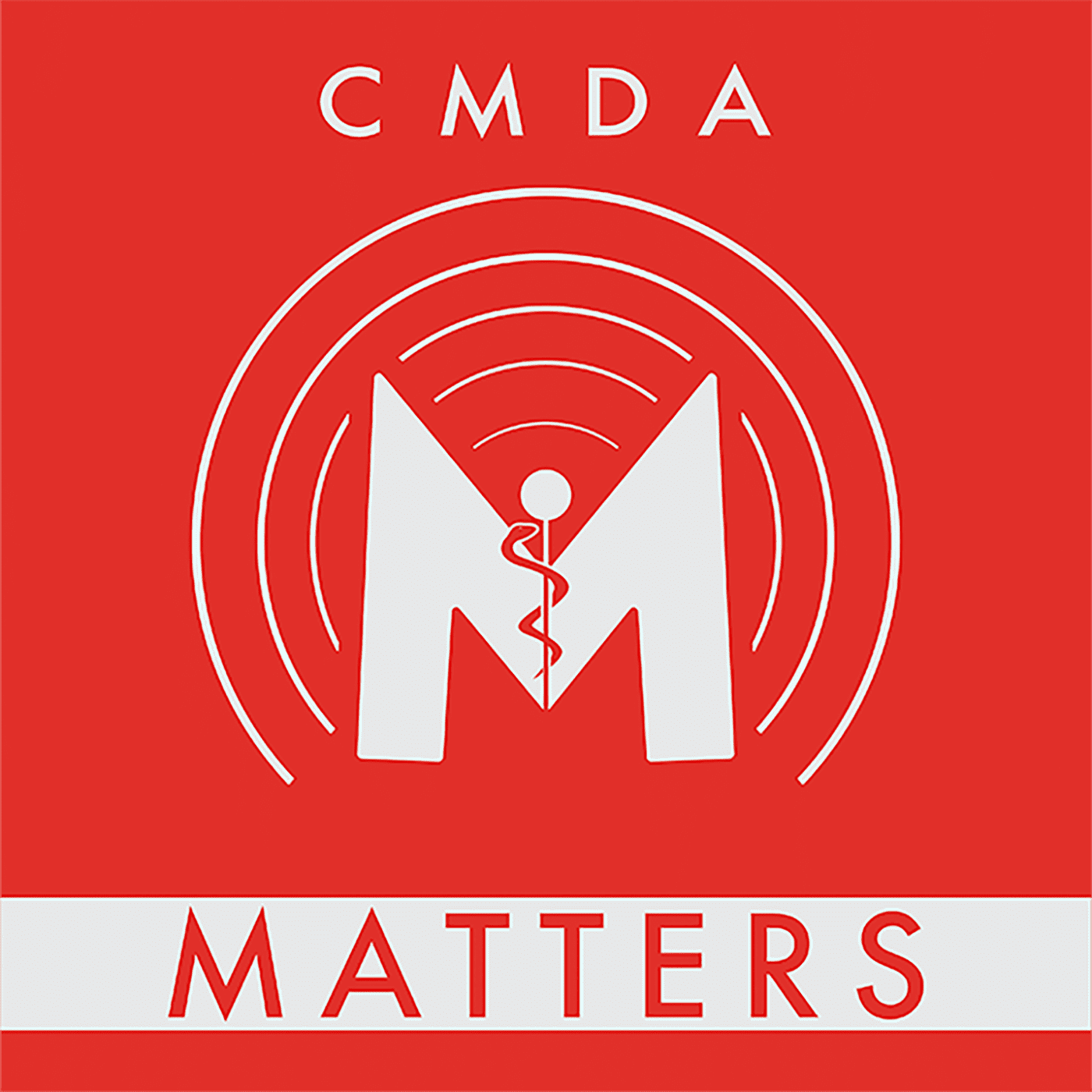[00:00:08] Speaker A: You're listening to Faith in healthcare, the CMDA Matters podcast. Here's your host, Dr. Mike Chubb.
[00:00:19] Speaker B: Welcome friends to Faith in Healthcare where we continue to explore the issues that matter most to Christian healthcare professionals. So whether you're in healthcare, married or otherwise connected to someone who is, or you're just simply interested in how God is working right now through Christ followers in patient care and beyond, we're so glad that you're here.
Today's guest is orthopedic surgeon Dr. Scott Southard. He is founder of In Jesus Name Medical Ministry. It's a church based, volunteer driven model that brings free outpatient clinics to directly into local communities all across the great state of Nevada. The mission they have is to partner Christian physicians and other healthcare professionals with local churches to offer free medical care for the uninsured, for the underinsured, or anyone that's in need. Just like Jesus Christ did. What began with a simple prayer from a doctor in Reno, Nevada and and a donated mobile coach has grown into a regional network mobilizing physicians and nurses and other volunteers to serve together in Christ's name.
You're gonna hear how the team structures monthly clinics, why partnering with churches creates a natural faith forward environment, and how hospitals have actually stepped in to provide low cost services as well as how In Jesus Name even addresses medical liability coverage so clinicians can serve with confidence.
Dr. Southard shares moving stories of transformation from a child taking her first steps after surgery to a deaf grandmother regaining her ability to do signing each one showing how meeting physical needs In Jesus Name well, it opens hearts to spiritual healing and renewed hope.
These are just glimpses of what happens when healthcare becomes a living ministry that vividly points to the great physician.
Whether you're dreaming of starting a clinic in your own community or simply need fresh wind, so to speak, in your professional sails, Dr. Southard's story offers both a practical path and as well as a personal invitation to serve just like Jesus did right where you are. So let's dive in.
Well, today on Faith and Healthcare I have a guest whom I've known for several years who's figured out a way to take health care in an outpatient basis in the state of Nevada to places where people are in great need. And he's figured out a way to get the local churches involved to join him along with the healthcare professionals in those congregations to do ministry in Jesus Name. In fact, that is the name of the ministry in Nevada starting I believe in Reno, Nevada called In Jesus Name Ministries. So Dr. Scott Southard, thank you for joining me on faith and healthcare today.
[00:03:45] Speaker C: Thank you for inviting me. It's wonderful.
[00:03:47] Speaker B: Well, Dr. Southard is an orthopedic surgeon. And you've been in practice in orthopedics for how many years now?
[00:03:55] Speaker C: 30. 30 plus, actually. Okay. And most all of that has been in and around the Reno area of Nevada.
[00:04:03] Speaker B: You reached out to me several years ago, I think even while I might have been still executive vice president or just shortly after I became CEO. And you said, I want to tell you about something very exciting about reaching out to those in our own towns and cities, within our own state and see if CMDA might be interested in partnering. And tell us briefly what you described to me then about this medical ministry called In Jesus Name.
[00:04:28] Speaker C: I guess it was really God's spirit. That is the core of motivation for me to get involved in doing this.
I did some short term missions overseas in various places and I came back from mission trip, I think actually it was to Kenya, which I know is dear to your heart. But I came back from one of my short term missions trips and I really wanted to do mission work all the time. But I didn't have the time to go to Africa or South America.
I couldn't take two and three weeks off frequently. And I had responsibilities here in Nevada area that I could not ignore. But I wanted to serve. I wanted to serve the Lord with my skills and what he's given to me, I wanted to serve. And so I was in prayer one day.
I sincerely asked God, I asked the Lord and I said, lord, if you were an orthopedic surgeon in this region and you had to stay in this room, what would you do?
And a very strong, clear thought came across my mind. It was not audible, but it was strong and profound. And that thought was just, I would do what I did.
That's all. I was in my quiet time at the time. And so I was praying and, and studying his Word. And the thought was I would do what I did.
And so I sort of stopped. It caught me off guard and made me stop in my thoughts. And then I prayed or asked another question in prayer. And that question was, what did you do?
And the answer of thought that came through my mind was I went around from place to place, told people about the kingdom of God and healed them of illnesses and diseases.
Well, that's Matthew 9:35 as it turns out. And I think that was maybe on my mind. But anyway, that's the thought that came through strong and clear. And then nothing.
So I, you know, I just said in my prayer, I said, okay.
And that was motivation for me to step forward.
I was in a Christian Bible study with several other physicians at the time, and I shared the entire concept and the entire experience with them. And they both wanted to get involved. They wanted to serve Jesus with their skills.
So then we had myself, an orthopedic surgeon, emergency room doctor, and a general surgeon. All three of us. Now everybody wanted to get involved. And then so the next part was, well, how do we be mobile?
So in this region. This region services various ski resorts around.
They used a 35 foot motor coach that was custom outfitted with X rays and computers and everything. And they drive it up to the ski resort in the winter season and it would be the emergency room for the whole resort, right?
[00:07:50] Speaker B: Yeah.
[00:07:51] Speaker C: But then the hospital bought hard copy space within the resort itself, so they didn't need that anymore. And it was just parked over in the parking lot and had been there for a year or two.
And so, aha, we got an idea, you know, hey, maybe we could use that beautiful motor coach.
I wonder if the hospital would give it to us. So I went and talked to the CEO, asked him about that, and I said, this is what we want to do. Would you consider donating that? We want to serve our community, serve our region.
We have three physicians. So I'm sitting in his office and I asked him, would you consider donating that to us?
And he said no.
And he made me wait about 10 seconds or so, and then he said, but I'll sell it to you for $1.
And so, boom. And then we had that mobile capability and we just grew from there. But as far as the motivation is, it started with that, and then through the years, it's been such a positive experience to serve other people in need, and it's just grown and grown and grown.
[00:09:12] Speaker B: How many sites do you go to now? And I understand those are at churches. How did that come about?
[00:09:19] Speaker C: Well, you go to. In a year, we'll go to a dozen sites here in our region.
We have other chapters in other cities as well.
But in our region, we go to 12 sites, in other words, 12 churches. And some of the churches want to do it more than once.
And we've had so many churches want to participate in this in order for the churches to impact their communities, to impact their areas.
So now we do what we call hubs, where we'll have two or three or four churches all together come and we all do a free medical clinic together with doctors and nurses and everybody. And so that, that's how the process has grown.
[00:10:08] Speaker B: So what does your team look like, Scott, in terms of those who are coming from those local churches and join you versus say you had that main team with three physicians. And I know that it has grown and grown and grown your volunteers, but what is the percentage of those who work? And is it's on a Saturday, I believe, or is it on other days as well?
[00:10:28] Speaker C: So our team typically will be about 20 people that are medical people.
What has happened through the years is that once you have one physician who's willing to do this, then people just come out of the woodwork to help.
I mean, there's so many nurses and administrative personnel, you know, secretaries, medical assistants, PAs, nurse practitioners that are Christians, you know, they have the spirit of God living in them and they want to serve.
They hear about, oh, Dr. Smith, you know, is doing a free medical clinic in Jesus name. They just. They just come and want to serve. So now, on average, we have about 20 from our team. And we'll have, on average, we'll have five to seven physicians, sometimes 10 or 11.
And then we have the nurses and medical assistants, FNPs, all of that. So have 20. That constitutes 20. And then usually the church, they have volunteers, too. They want people in the churches. They want to activate their faith, of course, so they'll have 10 people there, too. So we end up with a group of 3, 30 servants to take care of an average of 40, sometimes 70 people every month.
We do it once a month. And we go to rural communities and in the city, both go to inner city areas.
[00:12:03] Speaker B: And do you have criteria for who? I mean, you're really wanting to reach out to those who are most needy. But do you exclude anybody? If people have insurance, are they excluded? Or you take all comers.
[00:12:17] Speaker C: We take all comers. Jesus did, yes. And we take all comers. What we end up with, you see that with partnering with the churches, we empower the churches to impact their surrounding neighborhoods, Right? So the churches reach out with flyers, social media, signs. They tell people from the pulpit, they do all these things, that there's a clinic coming. And so we bring our team and all of us together, we have this free clinic. And it's so wonderful. About 50% of the people who come, I would say, are from the local church itself or churches. Okay. And 50% are just from the neighborhood and the community and from other communities, too.
[00:13:09] Speaker B: Are all the pastors, Scott, do all of them seem to be as excited and passionate as.
Or is there a variable response and level of engagement from Pastors are, some of them very happier there, but aren't necessarily willing to show up and be a part of this ministry.
[00:13:26] Speaker C: They are all excited, all of them.
They love in Jesus name ministry. They love us. They're all so excited. Because I think in general, you know, churches look for ways to impact their communities, to reach out, and here we are helping them. Everything's for free. The patients can't believe it that a group of physicians and doctors and nurses and everybody in today's world would come to them to come to their neighborhood. No, no, no, no, no, no. What you do is you drive 45 minutes and you go to the doctor's office.
You go through a whole lot of steps and finally after a while, maybe you get to see a doctor.
That's the way our society works. No, this is the doctor. This is us. Like Jesus did. He went to the people. And so we as physicians, we go to the neighborhoods, we go to, to God's house. And people are blown away by that.
It just breaks their hearts. It's wonderful.
[00:14:38] Speaker B: And certainly it opens doors for spiritual ministry just as it did for Jesus in the gospels, big time. So with a ministry named in Jesus name, tell our listeners how it is that you guarantee in every one of these clinics, every one of these churches, I mean, we have. There are churches all over the spectrum in terms of the gospel today in America. So how do you make sure that the name of Jesus and the gospel stays front and center through each one of these efforts?
[00:15:07] Speaker C: We vet the churches. Okay. It is very easy to do now with the Internet and all the websites. It is easy to go into the website and look up what do you believe, and if you just take a few minutes and you can vet the church.
Also, there's verbal communications that occur and you get to know which churches represent Jesus. Truly. Some churches now that used to be mainline evangelical Christianity have left that, really. And there are gay people in the pulpit and all sorts of other deviations from God's word.
Yeah, we vet the churches online and sometimes we go visit the churches ourselves or one of our people. We'll just go and sit in the pew in the back and just listen.
[00:16:04] Speaker B: In terms of spiritual ministry, because this is in Jesus name. What does that look like practically in terms of how patients not only have you diagnosing and treating them, but also giving them spiritual encouragement, telling the gospel.
[00:16:17] Speaker C: Spiritually, they're greeted when they come in by other Christians who are at the registration desk with a very loving, embracing attitude while they wait for patients. They are reading Billy Graham literature that we provide, there's Christian music in the background, often a movie. The churches will play a movie while the patients wait.
When they check in and see the physician, see the doctor or the nurse practitioner, the doctor most always they pray with all the patients and they spend time which is so precious because oftentimes in our culture the time we have with a patient is metered. It's defined.
[00:17:03] Speaker B: Sure, absolutely.
[00:17:05] Speaker C: And in Jesus name ministry it's not like that. You spend whatever time the patient needs.
You know I'm just recounting a case, a young girl about 20ish who came in and she had a lot of fears about the medical system and she had a lot of anxieties and Dr. Schwartz just spent time with her. She developed a rapport with her and she was able to talk. And I think that girl developed confidence in Dr. Swartz that she genuinely cared for her in Jesus name. And they prayed.
Carol always prays and they prayed and Carol gave her some anti anxiety medications. Well this lady totally changed her life around and she's attended seven or eight subsequent clinics with us through the years and it's just a totally different person as a result of the spiritual.
I mean they prayed, the time, the way Jesus communicated that he loved people, that he has compassion.
And I've got other stories like that too. But as doctors, what we are free to do and what in Jesus name ministry allows you to do and encourages you to do is to pray with your patients. And the physicians are all Christian, they do it anyway whether we encourage it or not. But every that's a part of what we do. So if doctors want to live out their desire to serve others with their medical skills for Jesus, if they want to serve for Jesus and we totally empower them. So everything I just said and the Billy Graham literature, imagine they walk. So get so they walk into a room. Because we use pastors offices, children's education rooms. Right. The sanctuary is the waiting room.
[00:19:19] Speaker A: Before we continue with this week's episode, here's a special announcement for you.
On November 14th and 15th, 2025 in Fort Worth, Texas, take part in sailing process witness training.
This 10 hour interactive course is designed to equip healthcare professionals and students to confidently live out their faith and be witnesses for Christ in clinical settings.
Research shows that most patients want their healthcare providers to consider their spiritual needs. Yet many clinicians feel unsure how to do so. With respect and sensitivity, through engaging teaching, discussion and practical application, you'll learn how to care for both the physical and spiritual well being of your patients while honoring their values and your calling.
Learn
[email protected] and mark your calendar for the 2026 CMDA National Convention, April 23 through 26 in Loveland, Colorado, a time to renew your spirit, recharge your faith and connect with fellow believers in healthcare.
We're thrilled to welcome John Stonestreet, President of the Colson center and co host of breakpoint Radio, a nationally recognized voice on female faith, culture, theology and Christian worldview.
Convenient lodging is available at the Embassy Suites by the Hilton Loveland Conference center and Spring Hill Suites by Marriott, with special CMDA room rates reserved for attendees.
Learn more or register for either
[email protected] events CMDA is here to support and equip you at every stage of your journey as the nation's largest faith based professional healthcare organization.
Membership connects you with a community of like minded colleagues, resources and opportunities to live out your faith and practice.
Learn more and get
[email protected] we've got some big news. Something brand new is coming your way soon and we think you're going to love it.
We've been working behind the scenes to create an all new CMDA Online experience where you can more easily make dues, payments, donate to CMDA Ministries, register for events, manage your CMDA profile and much more. It's fresh, it's exciting and it's almost here as we get ready to launch this new interaction with our database. The system will be offline November 11th through 13th, 2025.
During that time, services like member accounts, payments, event registrations, the CMDA Learning center and the CMDA Go app will not be accessible while we upgrade.
If you wish to make an online donation during this time, go to CMDA.org give to use our temporary form and if you need any other assistance to between November 11th and 13th, just call our team at 888-230-2637 or send us an email at memberservicesmda.org we can't wait to show you what's next. The new CMDA Experience is almost here.
Let's jump right back into this week's episode.
[00:22:51] Speaker C: Lets say you were a patient and you had to wait to see the doctor for 30 minutes.
Okay, so you're in the children's education room sitting there on a table and on the wall in front of you is a picture of a giraffe that just says Jesus loves you.
He wants to be part of your life.
So you got to look at that for a half hour.
[00:23:14] Speaker B: Yeah, so we talk about faith flags and Some clinics, some secular clinics, you can't really put things like that. But obviously it's built into a church. It's built into a church clinic setting.
[00:23:26] Speaker C: Yes. And you know, another important ingredient, I must say is that partnering with the churches, there is a spiritual covering that. Okay. That occurs now for the weeks before the free clinic in Jesus's name. Right.
The churches are praying, they're praying about the clinic. This all makes a huge difference.
[00:23:50] Speaker B: Yeah, it's a great partnership between healthcare professionals who love Jesus and the local church which at CMDA is so very important to us. I also am just imagining that there are number of volunteers who find it so frustrating in their real job, Monday through Friday are restricted from doing anything like praying with patients. And of course we, in our various trainings, we try to help healthcare professionals to figure out ways to do it with gentleness and respect. But here you are. This is an outlet that may help actually deal with, prevent burnout because otherwise if your volunteers don't have this opportunity, they're just gonna burn out. In the kind of medicine in America today that you're asked to do.
[00:24:37] Speaker C: Yes, it's why I haven't burned out.
[00:24:41] Speaker B: And you've decided to do more of this, haven't you? You've decided to dial back on your regular orthopedic practice. And one question I have, there's going to be maybe a few orthopedic surgeons out there listening. Wait a second, you're seeing diabetics and all others. How are you as an orthopedic surgeon handling this wide array of disease?
[00:25:00] Speaker C: Jesus takes care of that. We have all types of physicians at every clinic. We have an orthopedic surgeon. Here in Nevada we have actually two orthopedic surgeons, a handful of family practitioners, internal medicine, dermatology, rheumatology, allergy, general surgery, the list goes on. I don't have to treat the things I'm not comfortable with.
Well, how do you have a complete clinic? No, you just provide what you can provide and Jesus, God will work through.
Right. He brings the different specialties into bear.
[00:25:41] Speaker B: And you've had healthcare systems, I understand, who've come alongside to offer very, very low cost lab results, X rays and so forth. Am I remembering that correctly?
[00:25:51] Speaker C: Yes, you are. That is very true. In our region, specifically in Nevada, there's Carson Valley Medical center south of Reno, who been very gracious and generous in northern Nevada, at Barton Memorial Hospital in South Lake Tahoe that services Nevada as well, a lot of Nevada actually.
Very generous. They just are very supportive.
We want to make it. The easy button for what we've realized is that when physicians are just willing to serve the Lord with their skills, it's so successful. It's a model that works with the churches. We'll talk hopefully about medical liability issues and those things, but it's a model that works. And what we want to do is share that and we can make it easy.
[00:26:46] Speaker B: Yeah, let's go there. Scott, you brought up medical liability. And so I'm sure some people listening are like, wait a second, how my hospital isn't going to be willing to cover malpractice insurance for me as I go outside the walls of that institution and take new patient care. So how you have dealt with that in a unique way tell our listeners.
[00:27:06] Speaker C: We are able to provide medical liability malpractice coverage for physicians not just in Nevada, but in other states within the continental US as well.
And we've been successful in doing that. It took us a couple of years to work through all the processes to make that. But basically, as a result of, there's a federal government program which I won't go into detail with, but if physicians come under the umbrella of In Jesus Name Ministry, we can get them medical liability insurance, which is better than the university. They might work for better than the hospital, they might work for better than private practice. When I started this, you know, 17 years ago with those other doctors and everything, I just used my private insurance policy.
I wrote to them and simply asked, hey, this is what we want to do. I didn't expect them to do it, but I wrote to them and asked and they came back very generously and said, oh, we're happy to cover you. All we want to know is where you're going to go and roughly the times, the dates.
So boom. And they actually been covering me for 17 years doing this. But the other mechanism is to go through In Jesus Name Ministry and federal government program which we've established, which are retired doctors, okay, now utilize. And we've been utilizing that program for four to five years now.
And so you don't have to be approved by your hospital. We have a university doctor who's employed by the university nearby, but the university couldn't cover him. Well, we've covered him, okay? And we have retired physicians who no longer have their offices open, but they're still wealthy stores of knowledge and experience.
So we cover that. We can cover them, and we do that by the federal government covers us and we cover our people.
Now, all of our doctors are covered with this program like myself, in addition to my private coverage.
[00:29:34] Speaker B: So what I'm hearing, Scott, is that if a doctor in another state, whether it's in the west or the Midwest or the east or wherever, if they follow some steps to become part of the In Jesus Name network, which this federal program recognizes and they're licensed physicians or nurses or otherwise, they will come under that umbrella of protection, correct?
[00:29:56] Speaker C: Yes. They need to do it by joining In Jesus Name Medical Ministry. And we set up a chapter of In Jesus Name Ministry. Okay. And they're covered. We just did this in Vancouver, Washington and they're covered. But it needs to be done through In Jesus Name Ministry.
[00:30:13] Speaker B: Well, our western region director, Wes Erhart, whom you know, for our listeners benefit. Actually I asked him, I gave him an assignment to come over from Sacramento, California to do a site visit and he was very impressed with what he saw happening. I think it was in Reno, it may have been elsewhere. But just what happened on that Saturday in the clinic that he was observing? I'd like us to go back to talk about the pastors. What creative things or what innovative things have you seen these various pastors in these churches doing to mobilize? You talked about prayer in advance. Obviously that's a way to get this effort on the radar of congregational people. But how do these pastors motivate their healthcare professionals within their churches?
[00:30:55] Speaker C: Pastors, obviously they speak of it from the pulpit. One pastor, I know when the clinic is going to be coming in three or four weeks. He puts flyers on every chair or every seat within the sanctuary and he tells people, hey, we are going to impact this community. I want you to give this flyer to a neighbor. Everybody, you guys do something. Put some feet to this.
And social media as well is a big, a big audience.
[00:31:26] Speaker B: And this is not just word of mouth, Dr. Souther, because you sent me a couple of not too long ago you sent me a couple of spiral bound manuals. One is a manual just for pastors. I was so impressed with this. To help instruct pastors so that they know we value you as a leader there, a shepherd in that congregation. And then a really nice manual on how to do In Jesus Name medical ministry for those who are interested. And I know you have a website, but where can our listeners go to find out more about In Jesus Name.
[00:31:58] Speaker C: They can go to in Jesus name medicalministry.org all spelled out one word.
[00:32:06] Speaker B: How many patients over these. I think you said 17 years.
How many patients do you think you've seen in all the sites over all the clinics? Any guess?
[00:32:14] Speaker C: Yeah, we're well over 7,000 patients and various surgeons in our team have done about 90 plus surgeries for free.
[00:32:27] Speaker B: So they have them follow up in their offices after they see them in the Saturday clinic?
[00:32:31] Speaker C: I guess.
Yes, that's what they do.
Yeah, we've approached various doctors and just asked them if they would take patients for free, you know and they're happy to do it and integrate it into their offices and they've just had a lot of support.
You know as a physician, I mean you usually, I mean I think doctors often think that oh you can't do that in the United States. Oh there's too many roadblocks, rules, regulations.
[00:33:03] Speaker B: That would be common comments I would guess.
[00:33:05] Speaker C: But we have experienced that we found a way to do it and to make it easy for doctors in any community, anybody, because it took us almost two years to work out all the logistics.
[00:33:18] Speaker B: Do you have paid staff or are they all volunteers who set up the weekend clinics?
[00:33:22] Speaker C: Yes, we do have paid staff but we have one full time paid staff to part time paid staff and then all everybody else is volunteer and they want to do it to serve the Lord, they don't want to be paid. This is the spirit that drives in Jesus name ministry and it's the reason why after a hundred clinics that we did, we as a group and as a board we said this, this works and it's an opportunity to serve for people who otherwise don't have an outlet. And we got to share this. And so that's what we're doing is we just want to give it to people. There's no cost, everything's free.
We're well financed actually and we provide, we just want to give and for.
[00:34:19] Speaker B: Our listeners watchers benefit knowledge that Dr.
Southard has been had a booth at our national convention for several years and so if you do come to our national convention drop by and introduce yourself and find out more and how maybe this paradigm that has been so successful in Nevada could be exported to your state and your location. And it's not just one week a year where you go on a short term mission trip to wherever overseas, but this can be something on a regular basis which Scott, you and your team have proven is a viable option. So I'm very grateful for that, for this example and for your faithfulness. Dr. Scott Southard, thank you for joining us today on faith and healthcare and God bless you and the rest of your team. Congratulations to all of you and in Jesus name for what you have done and may the Lord enlarge your territory significantly and May many who are hearing this testimony, this interview today be challenged to do something locally if they're not already. And many of our members and our champions are doing just that in very different ways. God has obviously led you on this path to represent him well, so God bless you.
[00:35:33] Speaker C: God bless you. Mike. Thank you so much.
[00:35:44] Speaker B: Many thanks to Dr. Scott Southard for sharing how in Jesus Name Medical ministry is showing what's possible when Christian healthcare professionals and the local church come together to serve in Christ's name.
His story offers an incredible model for us for delivering free and compassionate care to those who are in need.
If today's conversation stirred your heart to serve friends, just visit CMDA.org to discover ways that you can get involved and make a difference right where you are.
If this episode encouraged you, please share it with a colleague, a student or a friend. And be sure to follow Faith in Healthcare on your favorite podcast platform and social media to stay connected.
You know, at cmda, our mission is to educate, encourage and equip Christian healthcare professionals to live out their faith with courage and compassion.
If you're not yet part of this growing community, we'd love to welcome you. Just visit CMDA.org join and become part of a movement of Christ followers who are transforming healthcare through the love of Jesus.
Next week I'm going to be joined by CMDA Senior Vice President Dr. Bill Griffin for a conversation with an old friend and a former Mayo Clinic professor, Dr. Mark Topazian. He zoomed in all the way from Ethiopia. He's a gastroenterologist, a missionary, and he's author of a recent book that's been released, Healing Purpose Finding Satisfaction in a healthcare career.
Dr. Tapazian distills his decades of experience, including teaching medicine in Addis Ababa and discipling young clinicians into hard won wisdom on integrating faith and medicine as well as beating burnout and renewing purpose by recognizing and embracing God's presence in our daily clinical lives. We hope that you'll join us. I want to thank you for listening to Faith in Healthcare today. It's the weekly podcast from CMDA where our mission remains the same, bringing the hope and healing of Christ to our world through committed Christ followers in healthcare. That's what matters to us at cmda.
May you recognize this week that the Lord is always with you and that he is for you to do his good work. Thanks so much for listening today and we'll see you next time, Lord willing, on Faith in Healthcare.
[00:38:39] Speaker A: Thanks for listening to Faith in Healthcare. The CMDA Matters Podcast if you would like to suggest a future guest or share a comment with us, please email cmdamatterscmda.org and if you like the podcast, be sure to give us a five star rating and share it on your favorite social media platform.
This podcast has been a production of Christian Medical and Dental Associations.
The opinions expressed by guests on this podcast are not necessarily endorsed by Christian Medical and Dental Associations.
CMDA is a non partisan organization that does not endorse political parties or candidates for public office.
The views expressed on this podcast reflect judgments regarding principles and values held by CMDA and its members and are not intended to imply endorsement of any political party or candidate.
